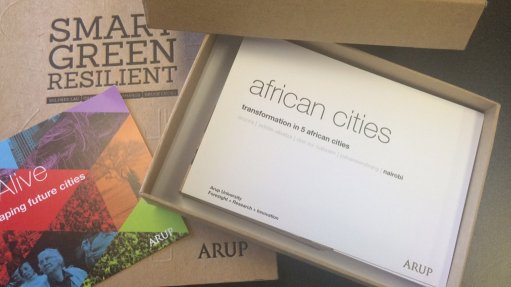
PARTICIPATORY TOOL Three dominant issues common to five African cities have translated into themes reflected in Arup’s city-specific engagement cards
Multidisciplinary engineering consultancy Arup held the first in a series of workshops on African cities at their Johannesburg offices last week. The workshop presented recently completed research by the Cities group at Arup that focuses on the unique challenges facing African cities and aims to spark solutions-focused conversations around place making. Participants included local government departments, research institutions, developers, funders and built-environment practitioners.
African cities and, specifically, Africa’s new urban agenda have become a talking point among businesses and institutions seeking to understand, influence and explore the opportunities arising from Africa’s rapid rate of urbanisation, according to Arup.
However, a lack of reliable data and long-term analysis of urban issues specific to the continent have led to largely experimental practice in the design and conceptualisation of African cities, with unpredictable and serious consequences for affected communities, according to the firm.
Driving urban development in African cities are projections that include Africa becoming the world’s largest labour force, while consumer spending is expected to increase to $2.2-trillion by 2030. Further, major African cities, currently contributing about $700-billion to gross domestic product, are expected to more than double these contributions to $1.7-trillion by 2030.
“While these statistics highlight the potential of urbanisation to fuel Africa’s rise, their realisation is dependant on accelerated infrastructure investments by cities to address inadequate and ageing service delivery mechanisms. In quantifying the scale of this challenge and its urgency, some estimates state that infrastructure to support a city the size of London needs to be built in Africa each year till 2050,” says Arup Cities lead Nico Venter.
Globally, Arup invests in more than 1 000 self-funded research projects a year that allow for the firm to build technical and reputational excellence and demonstrate their commitment to ‘shaping a better world’. The last five years have seen a large percentage of this research being focused on cities and urban development issues globally, addressing varied themes, such as walkability in cities, green infrastructure and smart connected cities.
The cities team in South Africa recognised the need to localise this research to illustrate relevance and critical understanding of African city contexts, where overall city expansion and urban rates of change outstrip developed-world norms. “The African city research programme was started [last year] and is a long-term commitment to building our knowledge and skills in working in these cities,” says Venter.
The research highlights a selection of case studies from around the developing world that address three common challenges – inadequate housing, lack of access to safe water and poor transport infrastructure – faced by five rapidly expanding cities in Africa – Johannesburg, in South Africa; Nairobi, in Kenya; Addis Ababa, in Ethiopia; Accra, in Ghana; and Dar es Salaam, in Tanzania.
“The outcome of the first phase of the research was a set of city-specific engagement cards, designed to start conversations around key issues,” explains Venter.
He adds that the three dominant issues common to all five cities have been translated into themes reflected in the cards, which are “intended as a participatory tool that encourages people to see things differently and collectively foster fresh ideas on city transformation”.
The workshop in Johannesburg kicked off the second phase of the research, with similar engagement sessions planned across the remaining four cities, through 2017. The workshops aim to capture local knowledge to enrich the research product and direct its development and ultimately contribute to ideas that further the African Union’s Sustainable Development Goal 11, which focuses on making cities and human settlements inclusive, safe, resilient and sustainable.
“African cities do not have the luxury of going through a period of industrialisation, but, as we are faced with the same pressures of urbanisation pushing us towards the development, [we are] starting conversations by asking what that [development] should be to fit our context,” Venter said.
“The outputs of phases 1 and 2 will be combined in a published work that will enhance our understanding of African urbanism,” Venter says, adding that this work will assist industry in appropriately meeting the present and future needs of citizens in their daily interactions with their city.